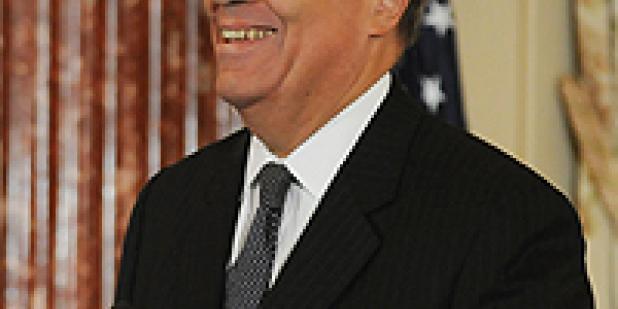Join us for a free one-day workshop for educators at the Japanese American National Museum, hosted by the USC U.S.-China Institute and the National Consortium for Teaching about Asia. This workshop will include a guided tour of the beloved exhibition Common Ground: The Heart of Community, slated to close permanently in January 2025. Following the tour, learn strategies for engaging students in the primary source artifacts, images, and documents found in JANM’s vast collection and discover classroom-ready resources to support teaching and learning about the Japanese American experience.
USC Honored With Public Diplomacy Award

This article was originally published on April 8, 2008 by USC News.
USC was honored April 8 with one of four inaugural Benjamin Franklin Awards for Public Diplomacy, a prestigious new honor bestowed by the U.S. Department of State.
U.S. Secretary of State Condoleezza Rice presented the award in a Washington, D.C. ceremony.
“(The Benjamin Franklin Award) is the most prestigious honor that the Department of State can bestow on American citizens who are making outstanding contributions to public diplomacy, both at home and abroad, and it reflects my conviction that the solutions to the challenges of the 21st century will come from all sectors of American society working together,” Secretary Rice said.
“We recognize USC’s Center on Public Diplomacy for having evolved into the world’s premier research facility in this field.”
Through a variety of programs and projects, USC is widely recognized for its pioneering leadership and contributions to academic scholarship and professional engagement in the field of public diplomacy. These include the USC Center on Public Diplomacy at the USC Annenberg School for Communication and the world’s first master’s degree program in public diplomacy.
The USC Center on Public Diplomacy was founded in 2003 as a partnership between the USC Annenberg School and the School of International Relations in USC College. It has since evolved into the world’s premier research center in public diplomacy, bringing together members of the diplomatic, academic, non-governmental organizations and corporate communities.
“The USC Center on Public Diplomacy leads our research into the global exchange of ideas and diplomacy,” said Adam Clayton Powell III, USC’s vice provost for globalization and a senior fellow of the center. “What is now clear is that diplomacy is not just for diplomats: It is for artists and writers, scientists and business executives, educators and students – indeed, for all of civil society.”
In 2005, USC launched a graduate-level degree program in public diplomacy, preparing students from around the world for leadership roles in international public service, business and nongovernmental organizations. The first full class of the Master of Public Diplomacy program is scheduled to graduate in May.
USC is also the only institution in the world to offer an intensive two-week training program specifically for mid-career professionals, providing an immersive environment in which to engage colleagues from across the globe in new research and methods through the Summer Institute in Advanced Public Diplomacy.
“It’s a tremendous honor for USC to be recognized as a galvanizing force in a field that has only begun to receive wider attention. A dedicated center and master’s program allows leading and emerging practitioners and scholars to advance an exciting new area of international relations,” said Geoffrey Cowan, USC University Professor, Annenberg School dean emeritus and founder of the USC Center on Public Diplomacy.
USC College Dean Howard Gillman said: “We are delighted to be the first educational organization chosen for the Franklin Award by the Secretary of State. It speaks to the important role that universities play in generating new knowledge on important questions and training the next generation of leaders.”
The State Department and USC have partnered on numerous public diplomacy-related projects. The State Department’s Public Diplomat in Residence program has been based at the USC Center on Public Diplomacy since 2006. The center also has provided the State Department with expertise about virtual worlds and the opportunities they provide for intercultural dialogue and public diplomacy.
“As new technologies make information accessible to more people, our nation needs to have a deeper understanding of the contribution that public diplomacy and soft power can make to advance America’s interests around the world,” said Ernest J. Wilson III, dean of the USC Annenberg School for Communication. “We are honored that USC’s leadership in this area is being recognized with the inaugural Benjamin Franklin Award.”
USC Annenberg School was a founding member of the Edward R. Murrow Journalism Fellows Program, announced by Secretary Rice in 2005. Participating schools host international journalists, encouraging journalistic freedom around the world and promoting deeper understanding of American practices and institutions.
In addition, Rice helped USC commemorate a landmark event in the United States’ public diplomacy efforts – the 50th anniversary of Dizzy Gillespie’s State Department-sponsored world tour in 1956.
According to the State Department, the Benjamin Franklin Award is given for a person or organization’s impact on public diplomacy-related efforts, service to the larger community, development of best practices for adoption by other organizations and long-term engagement with participants and issues.
Featured Articles
Please join us for the Grad Mixer! Hosted by USC Annenberg Office of International Affairs, Enjoy food, drink and conversation with fellow students across USC Annenberg. Graduate students from any field are welcome to join, so it is a great opportunity to meet fellow students with IR/foreign policy-related research topics and interests.
RSVP link: https://forms.gle/1zer188RE9dCS6Ho6
Events
Hosted by USC Annenberg Office of International Affairs, enjoy food, drink and conversation with fellow international students.
Join us for an in-person conversation on Thursday, November 7th at 4pm with author David M. Lampton as he discusses his new book, Living U.S.-China Relations: From Cold War to Cold War. The book examines the history of U.S.-China relations across eight U.S. presidential administrations.




